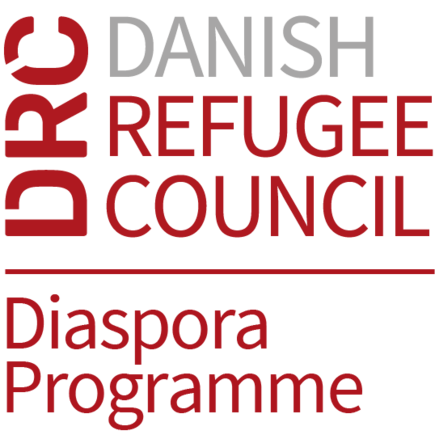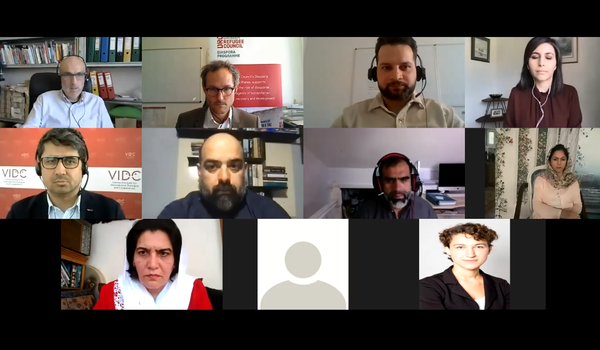On April 26, the VIDC and the Danish Refugee Council’s Diaspora Programme (DRC DP) convened an online public event “Afghanistan Peace Talks - A Road to Nowhere? to examine the progress of the peace talks between the Afghan government’s delegation and the Taliban negotiators. The online event Followed the announcement of the withdrawal of troops by the US and NATO, and was attended by 130+ participants, with nearly 4,000 following or watching the video on social media. The event focused on the progress of peace talks, the view from the ground across Afghanistan, participation of civil society including Afghan diaspora, protection of women’s and minorities’ rights, and the measures that are needed to prevent Afghanistan from falling into another chapter of civil war.
President Joe Biden announced the withdrawal of the United States’ combat forces from Afghanistan by 11 September 2021, the twentieth anniversary of the attacks on New York and Washington. Meanwhile, the Turkish government is aiming at hosting a U.N.-led conference on the peace process in Afghanistan after Ramadan and Eid festivities. The upcoming peace conference should serve as a platform for the Taliban and the Afghan government to reach an agreement to end the war in Afghanistan. A cease-fire and the creation of an interim government to secure peace are expected to be the main topics of discussions. However, the slow pace of talks between the Afghan government and the Taliban thus far suggests it will be difficult to reduce violence and reach a political settlement before US troops are withdrawn. U.S and NATO officials have continually said that the Taliban have so far failed to live up to their commitments to reduce violence in Afghanistan.
For this event, we had an experienced panel with Fawzia Koofi, a female peace negotiator from the Afghan government delegation, Dr. Sima Samar, the former head of Afghanistan’s Independent Human Rights Commission, the Afghan Journalist Bilal Sarwary and Rahelah Sediqi, a women’s rights activist from the Afghan diaspora in the UK.
Why is there so little progress in the peace talks?
There are a number of assumptions that the Doha agreement signed between the US and the Taliban on February 29, 2020 made the peace process flawed. For one, the Afghan government was not a part of the negotiations nor was it a signatory to the final agreement. The US gave the Taliban much more recognition and acknowledgement than they deserve and completely undermined the sitting Afghan government, stated Fawzia Koofi and Sima Samar.
“Fawzia Koofi: The Taliban has been given a world stage, while the Afghan government as a world partner recognized by the world has not been given the same stage. So that changed the mood in Doha. The Taliban were put in the win-win situation – both winning in the battlefield and winning in the negotiating table […], We were obliged to do things that we were not signatory of, such as the release of 5,000 prisoners”.
When the agreement was finally signed between the Taliban and the US, the Taliban have gained “the mentality of victory”; if they do not get what they want in the negotiation table, they nevertheless enjoy the victory in the battlefield. “That was the main obstacle for us to reach to an agreement with the Taliban sooner in Doha,” Fawzia Koofi added. The US started the negotiations with the Taliban, which was “dubbed as a peace process, but in reality, it was an exit deal with many secret parts,” Bilal Sarwary said. The biggest leverage that the Afghan government had was the release of 5,000 prisoners that were released under immense pressure by the US. “What happened when those prisoners were released? People got killed in the districts, villages, and provinces” Bilal Sarwary added.
Furthermore, Biden’s decision on the complete withdrawal of US and NATO forces from Afghanistan made the situation extremely complex both in Doha and in Afghanistan. Fawzia Koofi stated that:
“after long negotiations, we reached an agreement on four major items and were discussing further on how to move forward with the Istanbul conference, suddenly Biden announced their unconditional withdrawal from Afghanistan. We were surprised completely. We thought that the four items of the Doha agreement were interlinked, and that the creation of a political settlement will lead to the withdrawal of the foreign troops.”
This made the situation more complex in the negotiation in Doha but also created huge uncertainty in Afghanistan. People talk about the “worst-case scenario” like the situation following the Soviet withdrawal during the 1990s.
Weakness to work together
The second issue is the weakness of the Afghan government “to unite people from across various factions,” mentioned Sima Samar, adding that the lack of unification of people in the peace process is “a big, missed opportunity and a big loss”. Instead of forming an inclusive negotiating team that represent the victims, civil society, women and the most vulnerable factions, “the 15 seats of negotiation were given as trophies and tokens by the government,” Bilal Sarwary said. Besides, people are confused and afraid, as they hear different things from the presidential palace and the office of the High Council for National Reconciliation regarding peace and the future of Afghanistan, Bilal Sarwary explained.
The third major issue is the divergent priorities of the two sides – meaning that the Afghan government demands a ceasefire, whereas the Taliban’s long-term goal is to create an Islamic structure. This can mean several things, but essentially a form of government that is ruled by the principles of Islamic values. Fawzia Koofi said that we asked the Taliban:
“[…] let us talk about the ceasefire, they on the other hand asked to talk about the Islamic system. We didn’t know what they mean by Islamic system. We wanted to discuss if they intend to preserve the core values of the citizens or so. But they were not ready for that. My sense was that they were waiting for the assessment of the Biden administration to see what comes from there.”
The main problem is that the Taliban emphasize that they will provide Afghan women with the rights according to Islamic Sharia – but their own interpretations of Sharia. “we don’t know their exact interpretation of Sharia and they don’t give us example, which state is the example of the Taliban regime that they want such Islamic state in the country,” said Sima Samar. The ceasefire, which is needed as a first step “to stop bleeding and stop adding wounds in the society” is neither a strong condition in the Doha agreement nor a top agenda for the Taliban to discuss. Sima Samar explained that:
“we need to ensure ceasefire at first place and work for a durable peace in Afghanistan through inclusivity, united approach by the people, democratic or republic system, and acknowledgement of the people. People who committed crimes should acknowledge the sufferings of the people and ask for forgiveness from the victims who are in war for 43 years in Afghanistan.”
Sima Samar warned that if ceasefire is not ensured, then the bleeding will continue and this will consequently create a more hostile environment, and will cause more pain and wounds in the society. The absence of a ceasefire and of a credible durable peace process will leave a vacuum for new phases of conflict in the country. “Let us hope that the international community does not abandon Afghanistan as they did during the 1990s. Let us hope that the regional dynamics are also brought on the table, as the regional states are not so innocent,” Bilal Sarwary said.
The role of the Afghan diaspora in the peace process
Rahelah Sidiqi, women’s rights activist from the Afghan diaspora, underlined possible ways in which the Afghan diaspora organizations in Europe can play a role in contributing to the peace process and different kinds of assistance to Afghanistan and Afghan diaspora in Europe. Rahelah Sidiqi explained that there are nearly 7 million of Afghan diaspora living outside Afghanistan, “with intellectual background and enthusiasm to contribute towards Afghanistan”.
There are two major and interconnected ways that can ensure the contribution of the Afghan diaspora. First, the “intellectual communities of Afghan diaspora should come together and knock the doors of all those international allies and their host countries as citizens of Afghanistan in an organized and strategic way,” mentioned Rahelah Sidiqi. In this manner, diaspora will be able to do efficient advocacy for Afghan peace process. As they will be able to organize conferences, engage in dialogues, and take part in different programmes. Second, for the Afghan diaspora’s efficient contribution, socio-economic support by the host countries is crucial. “Their host countries need to see their values and contributions […] I have met so many Afghan diaspora organizations and individuals across Europe who enthusiastically want to contribute towards Afghanistan, but they need mobilization and funding assistance by the host countries for their engagements,” Rahelah added.
The panelists also called for joint and swift actions to ensure ceasefire and subsequently a durable and just peace for Afghan people, as mentioned by Sima Samar, Bilal Sarwary, and Fawzia Koofi. “Afghanistan should not be abandoned!” concluded all the speakers.



